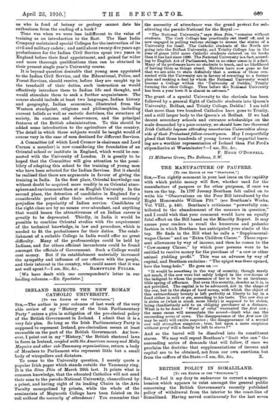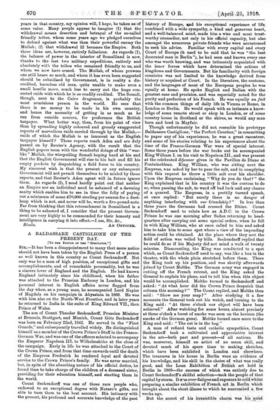BRITISH POLICY IN SOMALILAND.
[To THE EDITOR OF THE "SPECTATOR."] Sts,—I feel it my duty to endeavour to correct a misappre- hension which appears to exist amongst the general public concerning the British Government's recently published policy of withdrawal from the interior to the coast-line of Somaliland. Having served continuously for the last seven years in that country, my opinion will, I hope, be taken as of some valve. Many people appear to imagine (1) that the withdrawal means desertion and betrayal of the so-called friendly tribes, whom some years ago we pledged ourselves to defend against what was then their powerful enemy the Mullah ; (2) that withdrawal i11 becomes the Empire. Both these ideas are, however, entirely fallacious. As regards (1), the balance of power in the interior of Somaliland is now, thanks to the last two military expeditions, entirely and absolutely with the tribes who remained friendly to us, and whom we now have armed. The Mullah, of whose prowess one still hears so much, and whom it has even been suggested should be subsidised by Government, is in reality a dis- credited, harmless old man, quite unable to make even a small hostile move, much less to carry out the huge con- certed raids with which he is so readily credited. The Somali, though, next to the Cairo dragoman, is probably the most avaricious person in the world. He sees that there is no money to be made in his own country, and hence the necessity of getting in as much as he can from outside sources, for preference the British taxpayer. What better way, then, from his point of view than by spreading highly coloured and grossly exaggerated reports of marvellous raids carried through by the Mullah,— raids of which the Mullah is as innocent as the English taxpayer himself ? These reports reach Aden and are duly passed on by Reuter's Agency, with the result that the English papers teem with the wonderful doings of this "war- like " Mullah, the wirepulling Somali hoping hard at his end that the English Government will rise to his bait and fill his empty pockets by despatching a field force to his country. My sincerest wish is that the present or any subsequent Government will not permit themselves to be misled by these reports, and that Reuter's Aden agent will in future ignore them. As regards (2), I need hardly point out that neither an Empire nor an individual need be ashamed of a dawning sanity which enables him to see in time the folly of paying out a minimum of some 270,000 sterling per annum for a dust- heap which is not, and never will be, worth a five-pound-note. Far from thinking that this retrenchment in Somaliland is a thing to be ashamed of, I consider that the present Govern- ment are very highly to be commended for their honesty and intelligence in carrying it into effect.—I am, Sir, &e.,















































 Previous page
Previous page